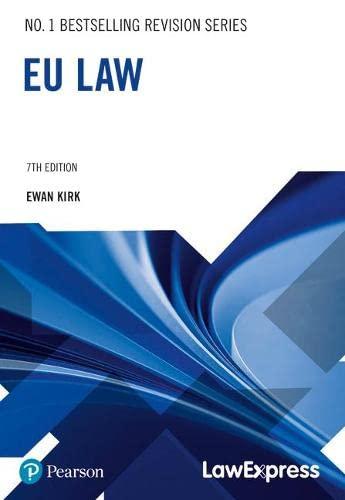Question
Read Paur v. Rose City Dodge, Inc., the case that follows. Identify the battery issue involving defendants Green and DeVon. Paur v. Rose City Dodge,
Read Paur v. Rose City Dodge, Inc., the case that follows. Identify the battery issue involving defendants Green and DeVon.
Paur v. Rose City Dodge, INC.
438 P.2d 994 (Or. 1968)
HOLMAN, Justice.
Defendants in this action for damages for an alleged battery appeal from a judgment entered upon a jury verdict for plain-tiff, assessing damages as $5,000 general, $499.50 special, and $15,000 punitive.
Plaintiff, Louis Paur, was employed as a salesman at defendant Rose City Dodge (Rose City), a car dealership. Defendant Anthony ("Tony") Moss was employed as a lot boy at Rose City. Defendant Robert Green was general manager, and defendant James DeVon was salesmanager.
Plaintiff testified that as he was leaving the Rose City premises, he was attacked from behind, knocked down, and beaten by defendant Moss. Plaintiff claims that defendants Green and DeVon directed Moss to commit the alleged battery. Prior to the attack, Green and DeVon had been informed that plaintiff had interfered with a deal between Rose City and a Mrs. Betty Tuttle, a friend of plaintiff. Plaintiff told Mrs. Tuttle not to sign a contract for the sale of an automobile which was tendered her, and he marked changes on it which would have resulted in a substantial price reduction. As a result he had been discharged.
We first consider the assignments of error which challenge the denial of the motion of defendants Rose City, Green and DeVon for a directed verdict. The question presented is whether there was any substantial evidence to show that the individual defendants participated in the battery, and that defendant Rose City was liable vicariously.
To be liable for battery, each defendant must have participated in, aided, or procured the battery. Tauscher v. Doernbecher Mfg. Co., 153 Or. 152, 160, 56 P.2d 318 (1936). The evidence that Green and DeVon told Moss to "throw out" plaintiff was sufficient to raise a jury question whether Moss's battery upon plaintiff was pursuant to the directions of Green and DeVon.
Also, it was a jury question whether Green, as general manager, and DeVon, as sales manager, had authority to direct removal by force of unauthorized persons from Rose City's prem-ises. If either of them did, and such one as had authority ordered plaintiff's removal pursuant to such authority, and excessive force was used in carrying out the order, the corporate principal is responsible for the resultant injury. 10 Fletcher, Corporations 463, 4883.
There was testimony that Green, after learning of plain-tiff's action, told plaintiff he was fired, and then told Moss in the presence of DeVon and plaintiff: "If Mr. Paur comes back throw h him out." Later, according to plaintiff, Green told the plaintiff, who had come back to Rose City to return the keys of a car: "Get out of here, if you ever come back I will have you thrown out." According to plaintiff, he left the premises and then returned after noticing that Green had gone home. Plaintiff asked DeVon to assist plaintiff in collecting outstanding commissions. At the conclusion of their conversation, DeVon, according to plaintiff, made the following statements in the presence of Moss and plaintiff:
THESE ARE THE STATEMENTS MADE BY MOSS AND PLAINTIFF:
If you think I'm going to see that you get any of your commissions, you have coming after you screwed us out of a start of a deal you are crazy. * * *" * * * "* * * Get out of here. * * * I will have you thrown out. * * * Well, you can't lose an $800 deal for us and want me to still be your friend. * * * Tony, throw him out.* * *"
The battery immediately followed.
"* * * [W]here the use of force at times is part of the duty of the servant, the master is not excused from liability when the servant uses excessive, and even unjustifiable, force in the performance of his duty, and even though in so doing the servant disobeys positive instructions of the master. * * *" Barry v. Oregon Trunk Railway, 197 Or. 246, 261, 253 P.2d 260, 266, 267 (1953).
We next consider the assignments which challenge the trial court's refusal to withdraw the issue of punitive damages from the jury.
Defendants contend that there was no evidence of malice on the part of Green and DeVon, and therefore punitive damages should have been withdrawn as to all in accord with the rule in this state that plaintiff waives punitive damages if he joins as defendant one who is not liable therefor. Gill v. Selling et al., 125 Or. 587, 594595, 267 P. 812 (1928).
Both Green and DeVon knew that plaintiff had interfered with a profitable deal Rose City had proposed to Mrs. Tuttle.
Since Green and DeVon were entrusted with executive management of Rose City, the corporation could be found liable vicariously for their malicious acts. Pelton v. Gen. Motors Accept. Corp., 139 Or. 198, 204205, 7 P.2d 263, 9 P.2d 128 (1932); Barry v. Oregon Trunk Railway, supra, at 257; 10 Fletcher, Corporations 452, 4882.
It is only fair to remark that, on both sides, the trial of this case was a bare-knuckled affair with more emphasis on the prejudicial than on the relevant. There is no necessity to consider the charges of error relating to instructions. The judgment is reversed and the case is remanded for a new trial.
Step by Step Solution
There are 3 Steps involved in it
Step: 1

Get Instant Access to Expert-Tailored Solutions
See step-by-step solutions with expert insights and AI powered tools for academic success
Step: 2

Step: 3

Ace Your Homework with AI
Get the answers you need in no time with our AI-driven, step-by-step assistance
Get Started


